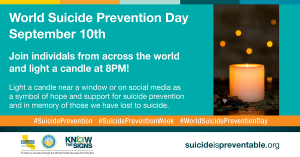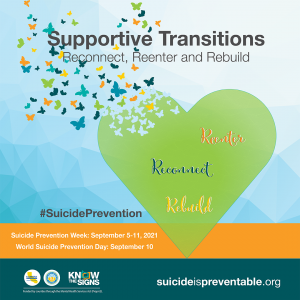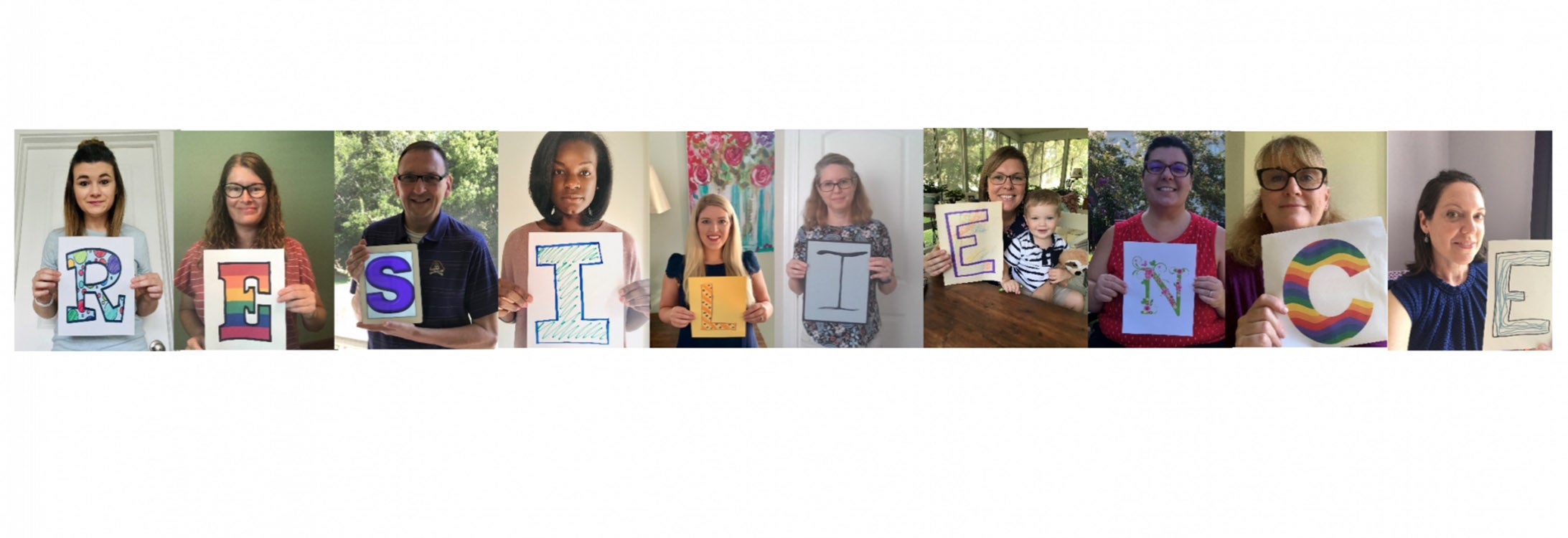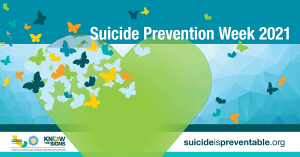Suicide Prevention Week 2021
IF YOU ARE EXPERIENCING A LIFE-THREATENING EMERGENCY, PLEASE:
- Call 911
- Call ECU Police at 252-328-6787
- Go to Vidant Medical Center Emergency Department at 2100 Stantonsburg Rd. or call your closest Emergency Room
Suicidal thoughts, feelings, and ideas can effect anyone regardless of age, racial background, gender identity, or upbringing much like any mental health concern. Often times suicide is the result of an unrated mental health condition and while suicidal thoughts are common they are often indicative of a more serious underlying need that should be addressed.
Adapted from NAMI
Hope
“The possibility of instilling hope is one reason that counseling is so important for people who are thinking about suicide. Professional counselors are experts at helping people see that suicide is a permanent solution to a temporary problem — and that there is hope for the future.”
Recovery
Mission
The mission of ECU’s Collegiate Recovery Community is to contribute to recovering individuals’ academic success in college through programming efforts, creation of a supportive environment, experiential activities, and the opportunity to increase awareness of substance issues on the college campus through peer education.
Services Provided
- Weekly check-ins and goal setting
- On-campus counseling and support groups
- Off-campus referral services
- Dedicated meeting spaces
- Sober recreational activities
- Service learning and volunteer opportunities
Four Pillars of the ECU CRC
- Recovery
Recovery is the cornerstone of ECU Recovery. We expect students whom have made a personal commitment to themselves and their peers to maintain their recovery and utilize the resources available to them to develop a lifestyle that will be conducive to their long-term wellbeing. - Education
Through workshops, outreaches, and sponsorship of speakers ECU Recovery and its members will work together to provide psycho-educational programming education to the students, faculty, and staff of East Carolina University on topics of alcohol and other drug issues to help reduce stigma, dispel myths about mental health, substance use disorders, and recovery, and promote prevention and harm-reduction. - Wellness
ECU Recovery is committed to the cultivation of mind and body connection. Utilizing the Eight Dimensions of Wellness through support groups, workshops, and experiential learning, we seek to assist members in finding their path to long-term recovery and overall wellbeing. - Service
Service is a vital part of East Carolina University’s culture and is essential to ECU Recovery. Through service we are able to pass on things we have learned to others and pay back to society a portion of what has been given to us. ECU’s Purple Pantry is the official philanthropic service effort of ECU Recovery.
Resilience
Resilience : noun
re·sil·ience|\ri-ˈzil-yən(t)s
: an ability to recover from or adjust easily to misfortune or change
Credit: Merriam-Webster
Underserved Population
Resources for Black Americans:
- The Steve Fund – Organization dedicated to the mental health and emotional well-being of students of color and providing crisis intervention via text by texting STEVE to 741741 to speak with a trained crisis counselor 24/7.
- Black Mental Health Alliance – To develop, promote and sponsor trusted culturally-relevant educational forums, training and referral services that support the health and well-being of Black people and other vulnerable communities.
- Black Mental Health Resources – A list of Black owned and focused mental health resources for various states across the US.
- Melanin & Mental Health – Resource, directory, and podcast with a desire to connect individuals with culturally competent clinicians committed to serving the mental health needs of Black & Latinx/Hispanic Communities.
- Self Care – Readings on the importance of self care, mental health care, and healing for people of color and within activist movements.
- ECU CCSD Sister Circle – This group is for African American/Black women to share and explore the intricate challenges they may face as a double minority at a predominantly white institution.
Resources for LGBTQI Individuals:
- The TREVOR Project – Leading national organization providing crisis intervention and suicide prevention services to lesbian, gay, bisexual, transgender, queer, & questioning youth and young adults.
- National Center for Transgender Equality – Advocates to change policies and society to increase understanding and acceptance of transgender people. NCTE works to replace disrespect, discrimination, and violence with empathy, opportunity, and justice.
- Health Professionals Advancing LGBTQ Equality – Provider directory specifically for those identifying within the LGBTQI community.
- Q Chat – A scheduled online discussion group for LGBTQ+ teens 13-19 years old facilitated by professional facilitators.
- It Gets Better – A nonprofit organization with a mission to uplift, empower, and connect lesbian, gay, bisexual, transgender, and queer youth and young adults around the world.
- ECU Dr. Jesse R. Peel LGBTQ Center – Strives to foster understanding and acceptance of the lesbian, gay, bisexual, transgender, and queer community. The Peel LGBTQ Center works each day to develop tomorrow’s leaders to serve and inspire positive change.
Additional Resources
- ECU Ledonia Wright Cultural Center – Provides specialized diversity and social justice experiences so all students can become confident, culturally aware, global citizens. Additionally, LWCC provides programming and services to support student success.
- Native and Indigenous Communities and Mental Health
- Asian American/Pacific Islander Communities and Mental Health
- ECU Office of Global Affairs International Student Resources
- Help for Service Members and Their Family
- Find the Autism Services and Support You Need
Self-Care
Reflection
The Facts
In the United States, suicide is the 10th leading cause of death, having risen 25% in the last 20 years with an estimated 123 Americans completing suicide every day. Worldwide, suicide is the 2nd leading cause of death for those 15-24 years old with depression being the leading cause of disability throughout the globe. Each completed suicide is the result of approximately 25 attempts and is four times more likely among males than females.The rate of suicide is four times higher for those identifying within the LGBTQ community and higher in those with less supportive family. While the highest suicide rates in the United States are among, Whites, American Indians, and Alaskan Natives, in 2017 suicide was the second leading cause of death for African-American individuals ages 15-24 years old who are less likely to seek mental health services.
One in two adults in the United States struggle with some sort of substance use. Studies show that approximately 21 million Americans have at least one addiction with only 10% receiving treatment and being most likely for individuals 18-25 years old. Drugs and alcohol are thought to be present factors in 50% of all suicides or violent crimes. 31% of all college students admit to symptoms of alcohol abuse and over 100,000 students are arrested annually for alcohol-related violations. Marijuana is the most widely used substance among college aged individuals with 1 in 22 students admitting to using marijuana daily. College students are also twice as likely to misuse medications prescribed for ADHD and 13% of students admitting to having tried other stimulants like cocaine by their senior year.
Credit: Each Mind Matters, SAVE, OMH, TWLOHA, The Trevor Project, NAMI, Alpine Recovery, Addiction Center, Rehab Spot
What Do I Do?
When you are concerned about someone or feel that they may need some extra support, it can be difficult to know how to start the conversation. Providing support by being a listening ear or encouraging your friend to engage in an activity can be a great way to approach potentially awkward situations and learn more on how to Start the Conversation
For many, it is not always clear as to when someone may be struggling with thoughts of suicide and oftentimes actions speak louder than words. Here are just a few signs to look for that may indicate a mental health concern:
- New impulsive or risky behaviors
- Irritation or on edge (not acting like
- Change in hygiene or daily habits (eating, sleeping, social habits)
- Trouble concentrating or completing tasks
- Substance misuse
- Isolation or withdraw
If your friend or another Pirate is displaying any of these or other concerning behaviors, that may be a sign of possible suicidal thoughts or actions, encourage a call to CCSD 252-328-6661, report a concern to ECU CARES or if there is a life-threatening situation call ECU Police at 252-328-6787 or 911.
CCSD Supports
Be in the Know

- Prevention Resources
- How to Help Someone Struggling with a Mental Health Condition
- Strategies for Coping with Suicidal Thoughts
- Learn about mental health among Black Americans and POC
- Resilience Self-Help Apps
- Grief Support for Suicide Loss Survivors
- Suicide Attempt Survivors
- Seize The Awkward
- Suicidal Signs and Support
- Self-Care Strategies
- LBGTQ Youth Mental Health 2020 Survey
- College Students and Drug Use
- Campus Drug Prevention
Reach Out
If you or someone you know if struggling with thoughts of suicide, self-harm, substance use, or other mental health concerns, consider utilizing these resources or contacting CCSD for Urgent Support Services for non-life threatening situations.
- REAL Crisis (if in Greenville): 252-758-4357
- National Suicide Prevention Lifeline: 1-800-273-8255 or chat online
- Crisis Text Line: Text START to 741-741 from anywhere in the U.S. about any type of crisis
- National Sexual Assault Hotline 800-656-4372
- The Steve Fund (specific to young people of color): text STEVE to 741741
- The Trevor Project (specific to LGBTQ+): 1-866-488-7386 or text START to 678678
- National Domestic Violence Hotline 1-800-779-7233
- Veterans Crisis Line: 1-800-273-8255 and press ‘1’ or text 838255; for deaf and hard of hearing call 1-800-799-4889
- Trillium Crisis and Access to Care Line: 1-877-685-2415
- Integrated Family Services Mobile Crisis: 1-866-437-1821
- Vidant Medical Center Emergency Department: visit 2100 Stantonsburg Rd. Greenville, NC or call 252-847-4100
- Your local hospital Emergency Department or calling 911

